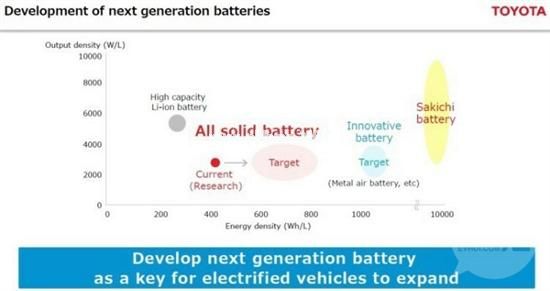Although in 2015 China's 379,200 vehicles, the cumulative promotion of 485,500 vehicles (statistical release of China Association of Automobile Manufacturers), has become the world's new energy vehicle promotion deserved leader, but how to break through the power battery unit and group technology , still restricts the development of the entire industry.
This article refers to the address: http://
According to the survey, up to now, including all domestically applied battery material systems, the monomer energy density of mass-produced power batteries is at most 150Wh/Kg, and even less after grouping. However, in contrast, the price has dropped a lot, and some companies' battery system quotations have already appeared below 2 yuan / watt hour.
Efforts to find breakthrough battery technology continue...
Toyota Motor launches new round of battery research and development

Toyota vehicle power battery research and development target
However, in the middle of the recent Japanese car companies, some of the latest technical information on power batteries has begun to spread. Take Toyota and Nissan as examples. In the independent announcement last month, they all explicitly proposed the idea of ​​increasing the energy density of the power battery pack to 1000Wh/Kg within a few years. We must know that Japanese engineers who were not good at "blowing" must have done this in mind. If this is the case, in the future, the same capacity of the power battery pack, the weight and volume are half lower than the current level is not a problem!
According to the Japanese auto news disclosure, Toyota is studying the use of magnesium instead of lithium as the basic chemical for batteries that may emerge in the next 20 years. There is also news that the solid polymer battery that Toyota is currently developing in full swing may be being quickly replaced by magnesium battery.
According to Toyota engineers, magnesium has two distinct advantages over lithium.
1. It allows for intensive energy storage;
Since magnesium ions have two positive charges and only one lithium ion, magnesium ion batteries have greater energy storage capacity than lithium ion batteries. A unit-quality magnesium-ion battery can store more energy, which allows the car to travel longer distances, allowing consumer electronics to last longer. Academic data even says that magnesium-ion batteries are by far the most theoretically promising. Green battery for electric vehicles. If we can achieve half of the theoretical capacity of magnesium-ion batteries, it will be a revolution in new ways of using energy.
2. It is safer than lithium. Lithium is an unstable metal that is prone to fire.
In theory, magnesium-ion batteries can be used to improve research and development space, far exceeding lithium-ion batteries. Magnesium is widely distributed, so the price of magnesium ion batteries will be very low.
However, Toyota also publicly acknowledged that the commercialization of magnesium-based batteries may still take 20 years. Therefore, Toyota's current help for electric vehicles is not great. Although it is a global market rival, Toyota's senior executives admit that Nissan's existing practices to improve lithium ion performance are easier to industrialize quickly.
Nissan is working on improving the performance of existing batteries
Although Japanese companies are the most unscrupulous companies in the world in terms of technology investment, in my opinion, the breakthrough in battery technology is very difficult, so it is more logical for Nissan to promote lithium-ion battery technology as much as possible. Nissan is looking for additives to improve the performance and capacity of today's lithium batteries.
At present, Nissan's idea is to improve the energy storage of lithium-ion batteries by adding an additive called amorphous silicon monoxide to lithium. This chemistry causes the battery to generate more lithium ions, which improves overall performance.
The challenges faced by Nissan's research engineers are enough to show that the current lithium ion performance improvement technology is equally complex. Until now, Nissan engineers have struggled to figure out how to use amorphous silicon because there is no precise way to determine their atomic structure. Therefore, Nissan's researchers decided to analyze its atomic properties by discovering a new method.
This method is almost feasible. Takao Asami, senior vice president of Nissan, said. "The invention of this new analytical method is necessary to further develop the next generation of high-capacity lithium-ion batteries, and it will certainly become one of our core technologies."
Laser radar contains LSPD safety laser scanner and LS laser radar. LSPD safety laser scanner is type 3 with CE certificate. It can be used for agv safety and industrial area protection. LS laser radar is for agv guide. Many famous agv manufacturers has installed LS laser radar to guide their agvs. Feedback from customers are quite posotive.
Laser Radar,Auto Guided Vehicle Guide Radar, Laser Radar,Safety Scanner,Safety Laser Scanner, Laser Radar
Jining KeLi Photoelectronic Industrial Co.,Ltd , https://www.sdkelien.com
